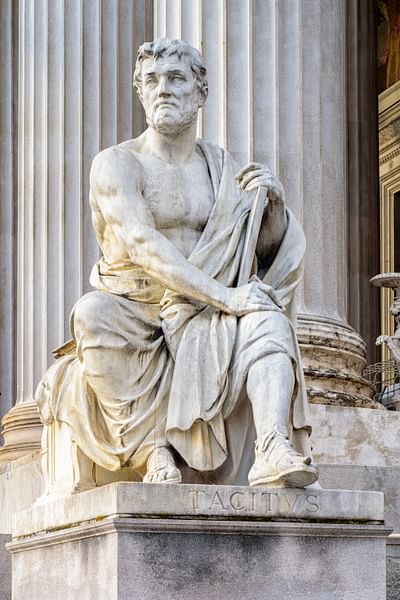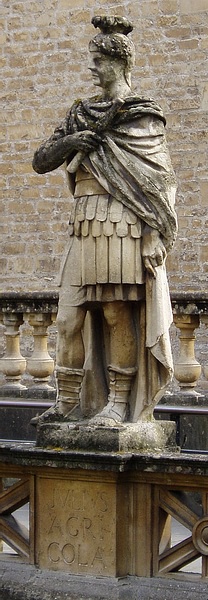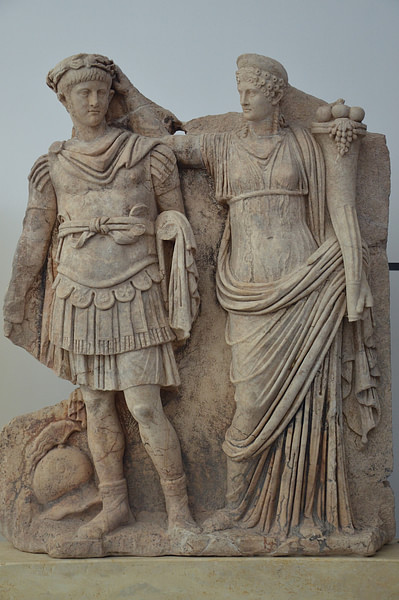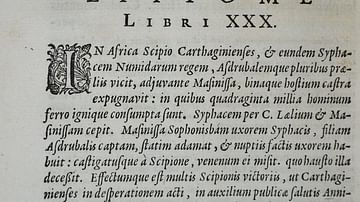
Publius Cornelius Tacitus (l. c. 56 - c. 118 CE) was a Roman historian, active throughout the reign of Trajan (r. 98-117 CE) and the early years of Hadrian (r. 117-138 CE). His best-known works are Histories and Annals, which cover the history of the empire from the time of the Julio-Claudians to the reign of Domitian (r. 81-96 CE). Although best known for his historical writings, he also had a long public career, serving as a quaestor in 81 CE, praetor in 88 CE, a tribune of the plebs, a consul in 97 CE, and proconsul of Asia from 112-113 CE.
Even though he was highly critical of emperors Tiberius (r. 14-37 CE), Nero, and Domitian, his works still revealed an allegiance and devotion to the empire; however, he is often criticized for his careless treatment of geography and military history. Many historians believe his personality is seen throughout his works, demonstrating imagination and wit but also revealing a sense of moral indignation. His surviving works are:
- Agricola (De vita Julii Agricolae)
- Germania (De origine et situ Germanorum)
- Dialogue on Oratory (Dialogus de oratoribus)
- Histories (Historiae)
- Annals (Annales)
Life
Considered by many to be the greatest of the Roman historians, Publius Cornelius Tacitus was born around 56 CE during the reign of Emperor Nero (r. 54-68 CE) to a prosperous provincial family from Cisalpine Gaul. He received an excellent education, studying both rhetoric and law while reading the works of the great Roman orator Cicero and the rhetorician Quintilian. Later, along with his good friend Pliny the Younger, he even made a brief appearance in a Roman law court. While her name is lost to history, he married the daughter of the governor of Britain, Gnaeus Julius Agricola, in 77 CE. The governor would be the subject of one of Tacitus' more famous works Agricola (De vita Julii Agricolae) written around 97-98 CE. Although mostly a biography, Tacitus took the opportunity as its author to lash out at Rome when he said they were the robbers of the world and sought domination in profit.
Agricola
Written about the same time as Germania, Agricola was a moral eulogy to his father-in-law. Agricola was more than a military man: a one-time consul, he rose through the ranks to become the governor of Roman Britain (74-84 CE). It is obvious to the reader that Tacitus did not hold Emperor Domitian in high regard. "Under Domitian more than half our wretchedness consisted in watching and being watched, while our very sighs were scored against us…" (On Britain and Germany, 97). Domitian is viewed as a paranoid despot, extremely jealous of the success of Agricola, but he had reason to be jealous. The governor experienced tremendous success during his time in Britain, extending the province's borders into Scotland (Caledonia) and engaging in an extensive Romanization of the island with the building of both temples and Roman-style buildings. Agricola also saw that the sons of the elite were properly educated, specifically in Latin. On Agricola's time in Britain, Tacitus wrote:
When duty had had its due, he put off the official pose; harshness, arrogance, and greed had long ceased to be a part of his make-up. He succeeded where few succeed; he lost no authority by his affability, no affection by his sternness. (59)

Happy you, Agricola, in your glorious life, but no less happy in your timely death. …You seemed glad to be doing your best to spare Domitian the guilt of killing you. (91)
Germania
Germania was a detailed account of the Germanic people: their customs, religion, government, and attitude towards warfare. When making a comparison, Tacitus viewed the Germanic people as socially pure while the Romans were seen as decadent and morally lax.
The Germans themselves, I am inclined to think, are natives of the soil and extremely little affected by immigration or friendly intercourse with other nations. ... For myself I accept the view that the peoples have never been tainted by intermarriage with other peoples, and stand out as a nation peculiar, pure and unique of its kind. (101-103)
They were a people with simple virtue, and when not engaged in warfare, they spend their time idle in sleep or gluttony. In contrast, as later expressed in his writings, Tacitus believed that the Roman Empire was experiencing a decay of morality; a view held years earlier by the orator Cicero (l. 106-43 BCE). And, as in Agricola, he took the opportunity to lash out at Rome. "Good morality is more effective in Germany than good laws in some places that we know." (117) Although the Germanic tribes had no taste for peace, Tacitus adds: "All the heroes and grim warriors dawdle their time away, while the care of house, hearth and fields is left to the women, old men and weaklings of the family." (113)

Dialogue on Oratory
Tacitus' Dialogue on Oratory, written sometime around 101-102 CE, is a discussion among four men (two lawyers and two literary men) concerning the status - or possible loss - of good oratory in Rome. In the opening paragraphs, Tacitus wrote that this was a conversation he had witnessed as a young man. Citing his own view he writes: "…our age is so forlorn and so destitute of the glory of eloquence that it scarce retains the very name of orator" (Complete Works, 735). Although one of the men claims there had been no decline, the other three are adamant that over the last century, especially since the time of Cicero, the eloquence of oratory had been sadly declining. This deterioration was mostly due to the political change since the time of the late Roman Republic, a period of political anarchy. Since that time, oratory was no longer necessary.
All of this is so neglected by the speakers of our time that we detect in their pleadings the style of every-day conversation, and unseemly and shameful deficiencies. They are ignorant of the laws; they do not understand the senate's decrees … (760)
From early in his studies as a young man, Tacitus had developed immense respect for Cicero and his oratory skill, and, speaking through one of the men, Tacitus wrote:
I come now to Cicero. He had the same battle with his contemporaries which I have with you. They admired the ancients; he preferred the eloquence of his own time. It was in taste more than anything else that he was superior to the orators of that age. (752)

Histories
While his Agricola and Germania, established him as a respected historian, his best-known works are his Histories and Annals. Together they cover the history of the empire from the time of the Julio-Claudians to the reign of Domitian - a total of 30 books. Unfortunately, many of the books are lost with only one-third of them extant. The Histories covers the political unrest that followed the death of Nero, the year of the four emperors, Galba (r. 68-69 CE), Otho (r. 69 CE), Vitellius (r. 69 CE), and Vespasian (r. 69-79 CE), ending with the rise of Domitian. While he had little respect for the first three of the four emperors, Tacitus believed that the rise of Vespasian to the throne presented a sign of a good future. He may have been a little greedy, but he was a born soldier and changed for the better once he took office. It was during this time that Tacitus served as proconsul in Asia.
In the introduction to Histories, he wrote:
I am entering on the history of a period rich in disasters, frightful in its wars, torn by civil strife, and even in peace full of horrors. …the age was not so barren in noble qualities as not also to exhibit examples of virtue. (Complete Works, 410)
He added that he wanted to write of the conditions of the city, the “temper” of the Roman army, the attitudes of the empire's provinces, and end with the weaknesses and strengths of the whole empire. Although well-received, regarding the military accomplishments of the emperors, the work was criticized as highly unmilitary, lacking strategy, chronology, and topography. He did, however, write to hold a reader's attention.
Annals
The Annals begins with the death of Augustus (r. 27 BCE - 14 CE) and ends prior to the death of Nero; lost, however, are two years of Tiberius (r. 14-37 CE), all of Caligula (r. 37-41 CE), one-half of Claudius (r. 43-54 CE), and the final two years of Nero. He wrote:
My purpose is not to relate at length every motion, but only such as were conspicuous for excellence or notorious for infamy. This I regard as history's highest function, to let no worthy action be uncommemorated, and to hold out the reprobation of posterity as a terror to evil words and deeds. (137)
He wrote during an important time as the Empire was establishing itself as the dominant power on the Mediterranean Sea, but he repeated his warning that Germania and Asia could present future problems. Although he seemed to admire the first emperor, Augustus, Tacitus believed that beginning with him, the Roman Senate became a diminished body. Emperor Tiberius, while seen as a reluctant emperor who found the office intolerable, did the not escape the ire of Tacitus. He is viewed as being sly, crafty and a tyrant. “…while his mother (Livia) lived, he was a compound of good and evil, he was infamous for his cruelty, though he veiled his debaucheries, while he loved or feared Sejanus” (227). Sejanus, who ruled Rome as Tiberius lay idly on Capri, is described as wicked and crafty. Claudius is seen as a man not only with a thoughtful personality but also dominated by his wives and freedmen. Tacitus took an opportunity to demonstrate a unique example of his wit. When Claudius was told of the death of Messalina, he did not ask about how she died but simply finished his meal. Tacitus spoke of his death at the hands of Agrippina:
All the circumstance were, subsequently, so well known, that the writers of the time have declared that the poison was infused into some mushrooms, a favorite delicacy, and its effect not at the instant perceived, from the emperor's lethargic and intoxicated condition. (283)

Nero at this time was at Antium, and did not return to Rome until the fire approached his house, which he had built to connect the palace with the gardens of Maecenas. ... Nero meanwhile availed himself of his country's desolation, and erected a mansion in which the jewels and gold, long familiar objects, quite vulgarized by our extravagance, were not so marvelous as the fields and lakes... (377-379)
Unfortunately, Tacitus' discussion of Nero's death is lost.
Conclusion
Throughout his works, Tacitus regrets the loss of the Republic and speaks of the decline of the empire which he attributes to the decay of the city's ever-growing decency - something his beloved Cicero saw in his own time. To explain the purpose of his works and show his respect for his fellow historians, he wrote:
Much of what I have related and shall have to relate, may perhaps, I am aware, seem petty trifles to record. But no one must compare my annals with the writings of those who have described Rome in the old days. They told of great wars, the storming of cities, of the defeat and capture of kings, or whenever they turned by preference to home affairs … (my) labours, are circumscribed and inglorious; peace wholly unbroken or but slightly disturbed, dismal misery in the capital, an emperor careless about the enlargement of the empire, such is my theme. (162)
One historian, David Potter, said, however, that he was well aware of the freedom granted him to write as he pleased, something not available to those in the early years of imperial Rome.






